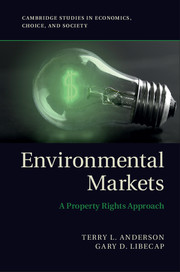Book contents
- Frontmatter
- Contents
- List of Figures and Tables
- Preface
- Acknowledgments
- 1 Who Owns the Environment?
- 2 Is Government Regulation the Solution?
- 3 Property Rights for the Common Pool
- 4 Local Property Rights to the Commons
- 5 The Politics of Property Rights
- 6 From Property Rights to Markets
- 7 Tackling the Global Commons
- 8 Property Rights and Environmental Markets
- Index
Preface
Published online by Cambridge University Press: 05 July 2014
- Frontmatter
- Contents
- List of Figures and Tables
- Preface
- Acknowledgments
- 1 Who Owns the Environment?
- 2 Is Government Regulation the Solution?
- 3 Property Rights for the Common Pool
- 4 Local Property Rights to the Commons
- 5 The Politics of Property Rights
- 6 From Property Rights to Markets
- 7 Tackling the Global Commons
- 8 Property Rights and Environmental Markets
- Index
Summary
Environmental economics often focuses on the failure of markets to allocate and manage natural and environmental resources efficiently. Under the banner of externalities, markets fail either because private costs are less than social costs or because private benefits are less than social benefits. The former results in overuse of the environment such as overfishing, excessive air and water emissions, and overpumping of groundwater basins. The latter results in too little provision of public goods such as preservation of endangered species habitats, maintenance of adequate stream flows for recreation or pollution dilution, or investment in biodiversity.
The policy remedies for market failure include both taxes to raise private costs to social costs and regulation to hold quantities to the optimal amount. There is little discussion in the literature on the process through which taxes or regulations are devised and implemented that lead to socially beneficial improvements. Are the costs of securing tax or regulatory policies less than the benefits, or alternatively is the route one of rent seeking and interest-group politics? What motivates politicians and regulatory agencies to adopt taxes or regulations that lead to effective correction of the externality? Because taxes are rarely implemented, at least in the United States, the obvious question is why, if they are so beneficial? Is their absence an indication that political interests dominate efficiency goals? Similarly, command-and-control regulations are adopted to limit use of air, water, fisheries, forests, and other resources, but they are costly and often do not capture the incentives of resource users to engage in more optimal production. For example, in the case of fisheries, fishing season limits have been a common regulatory response to overharvest, but they generally result in twenty-four-hour fish derbies, excessive investment in capital and labor to win the derby, and a glut of fish during the season. Regulations on the number of vessels lead to larger ones with more sophisticated equipment to find and catch fish.
- Type
- Chapter
- Information
- Environmental MarketsA Property Rights Approach, pp. xi - xivPublisher: Cambridge University PressPrint publication year: 2014
- 2
- Cited by

